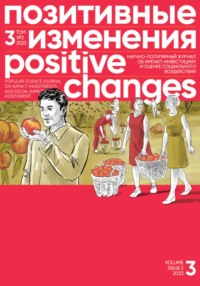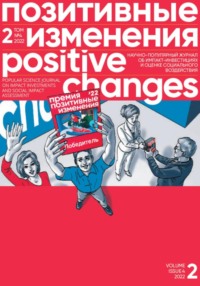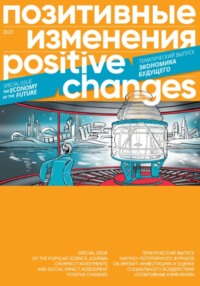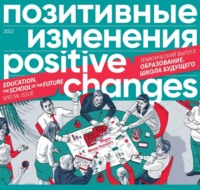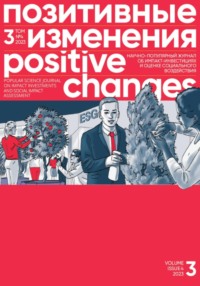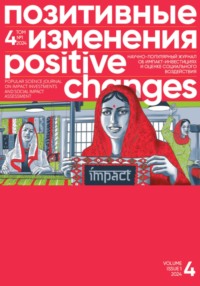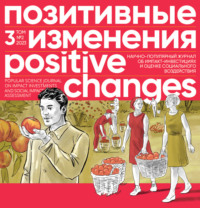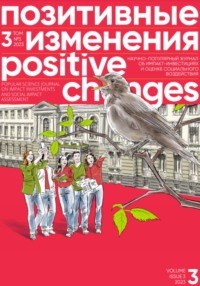 полная версия
полная версияПозитивные изменения. Том 2, № 3 (2022). Positive changes. Volume 2, Issue 3 (2022)
• Целевая аудитория регулярно участвует в добровольческой и волонтерской деятельности;
• Взрослые и дети участвуют в праздничных, спортивных и добровольческих мероприятиях;
• Семейные традиции спортивного оздоровления переходят в семейное партнерское взаимодействие;
• Отсутствие текучки кадров в акваклубе;
• Расширение круга компетенций тренерского состава;
• Увеличение количества плавающих детей в Московском регионе;
• У 100 % беременных женщин, которые проходили программы оздоровления в STARFISH, роды прошли без осложнений;
• 95 % родивших, которые ранее занимались в STARFISH, привели своих детей в возрасте от 1 мес. на грудничковое плавание;
• За последние 6 месяцев работы акваклуба проведено три больших районных праздника, два семейных фестиваля городского формата, спортивные забеги и заплывы на открытой воде;
• Взрослые стали больше времени проводить совместно с детьми;
• Концепция акваклуба «Бассейн у дома» позволяет снизить и/ или полностью отказаться от трат семейного бюджета на проезд до акваклуба, няню и психологическую помощь;
• Помощь детям с инвалидностью и их семьям в нахождении продуктивных и эффективных форм реабилитации и абилитации.
СОЦИАЛЬНО-ЭКОНОМИЧЕСКОЕ ВОЗДЕЙСТВИЕРазвитие сети STARFISH как акваклубов у дома способствует качественному изменению городской инфраструктуры, значительно улучшает здоровье населения, влияет на увеличение показателей продолжительности жизни, уменьшает затраты отдельно взятой семьи на медицинскую помощь.
МОДЕЛЬ ФИНАНСОВОЙ УСТОЙЧИВОСТИ85 % дохода акваклуб получает от индивидуальных занятий плаванием для грудничков, детей, подростков, взрослых, беременных и людей с инвалидностью.
15 % – от других программ оздоровления: EMS-тренировки, TRX-тренировки, миофасциальный релиз, акваджет, Душ Алексеева и оздоровительный массаж.
BabyApp. Мобильное приложение для родителей детей от 0 до 2 лет
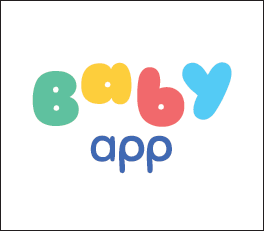

https://first.school/
Мобильное приложение BabyApp формирует персонализированную программу развития для ребенка по результатам заполнения диагностического чек-листа. BabyApp содержит обучающие курсы и марафоны для родителей, статьи и советы дня для снижения уровня родительской тревоги.
РЕШАЕМАЯ ПРОБЛЕМАВ России около 3 млн детей от 0 до 2 лет. Многих родителей волнуют вопросы детской неотложки, массажа, сна, прикорма и другие. Однако о пользе раннего развития у них недостаточно информации. Как результат, они остаются наедине со своими вопросами и тревогами. Часто родители путают раннее развитие с ранним обучением конкретному навыку, считая, что этим должен заниматься специалист. Педиатры, которые больше всего общаются с молодыми родителями, не имеют реальной возможности на приеме рассказать маме, что такое раннее развитие ребенка на самом деле. Приложение BabyApp популяризирует идею раннего развития и помогает сформировать индивидуальную программу развития для каждого ребенка.
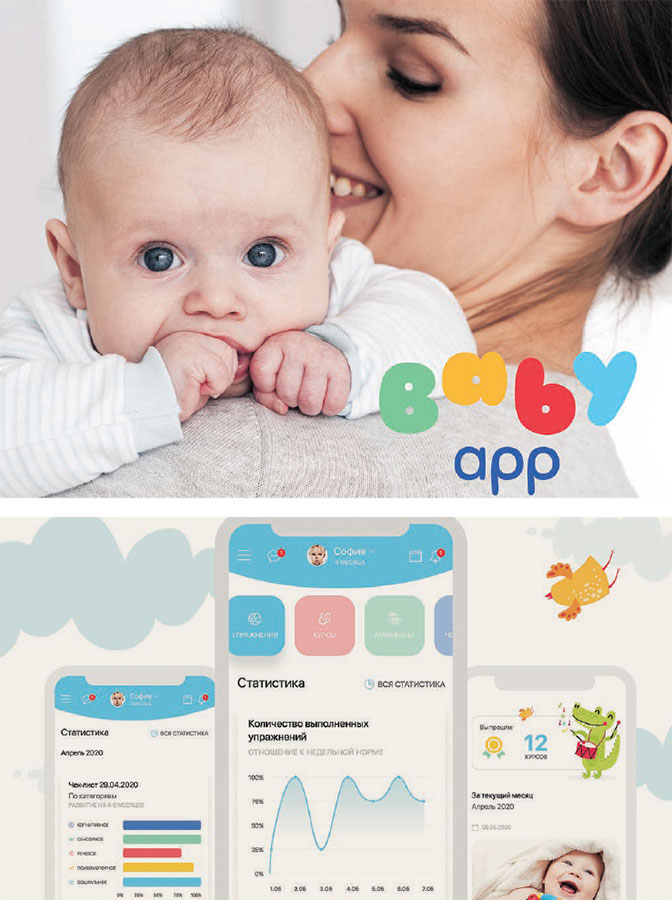
1. Разработана «Методика First.School», направленная на гармоничное развитие всех психических сфер нормотипичных детей в возрасте от 0 до 2 лет.
2. Разработано 18 диагностических чек-листов, которые заполняет родитель для формирования персонализированной программы занятий с ребенком.
3. Создано 1800+ развивающих игровых упражнений, включающие видео и текстовую инструкцию для родителей.
4. Отснято и подготовлено 17 курсов и марафонов, дающие ответы на самые волнующие родителей вопросы. Все курсы отличаются лаконичностью и прикладным характером. Достаточно 5–15 минут в день, чтобы освоить интересующий материал.
5. Написано 400+ статей, отвечающих на вопросы родителей.
6. Сформулирован 731 совет для эмоциональной поддержки мамы.
7. Проведено более 50 вебинаров и прямых эфиров по запросам пользователей.
8. Созданы площадки для общения родителей с психологами в социальных сетях.
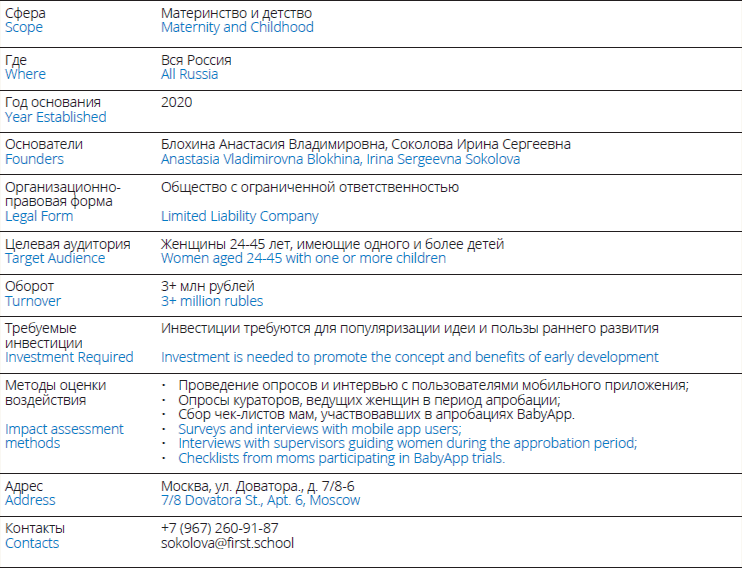
1. Получена положительная экспертиза Центра экспертиз Санкт-Петербургского государственного университета (кандидат психологических наук, старший преподаватель кафедры психического здоровья детей и родителей Варвара Аникина).
2. Получена положительная экспертиза Санкт-Петербургского государственного педиатрического медицинского университета (доктор медицинских наук, заведующая кафедры реабилитологии факультета послевузовского и дополнительного профессионального образования Галина Суслова).
3. Проведены успешные апробации приложения в кризисных центрах помощи женщинам в Москве и Санкт-Петербурге.
4. Проведена успешная апробация мобильного приложения BabyApp в центре раннего развития Краснодарского края.
5. Проведен обучающий курс «Методика First.School» и выдан 21 сертификат психологам и педагогам, планирующим работу с диадой «Мать-младенец».
ЧТО СДЕЛАНО ЗА ПРОШЛЫЙ ГОД1. Получены положительные экспертизы от профессиональных сообществ.
2. Проведено 870 игровых занятий и отсняты ролики для приложения, по которым сейчас обучают своих младенцев мамы.
3. Проект представлен на «Ананьевских чтениях» – ежегодной международной научной конференции, проводимой факультетом психологии Санкт-Петербургского государственного университета.
ПРЯМЫЕ РЕЗУЛЬТАТЫ ЗА 2021 ГОД5000+ скачиваний мобильного приложения.
СОЦИАЛЬНЫЕ ЭФФЕКТЫ, ДОСТИГНУТЫЕ ЗА 2021 ГОД1. 350+ мам занимаются с детьми регулярно.
2. Снижение риска отказа от детей у несовершеннолетних мам (по данным опросников в рамках апробации приложения BabyApp в кризисных центрах помощи женщинам).
СОЦИАЛЬНО-ЭКОНОМИЧЕСКОЕ ВОЗДЕЙСТВИЕПланируемое воздействие: активная популяризация мобильного приложения BabyApp в кругах профессионального и родительского сообществ.
МОДЕЛЬ ФИНАНСОВОЙ УСТОЙЧИВОСТИВыручка от продажи подписок.
New Life of the Publishing Project “Catalog “Social Entrepreneurship of Russia”
Vladimir Vainer
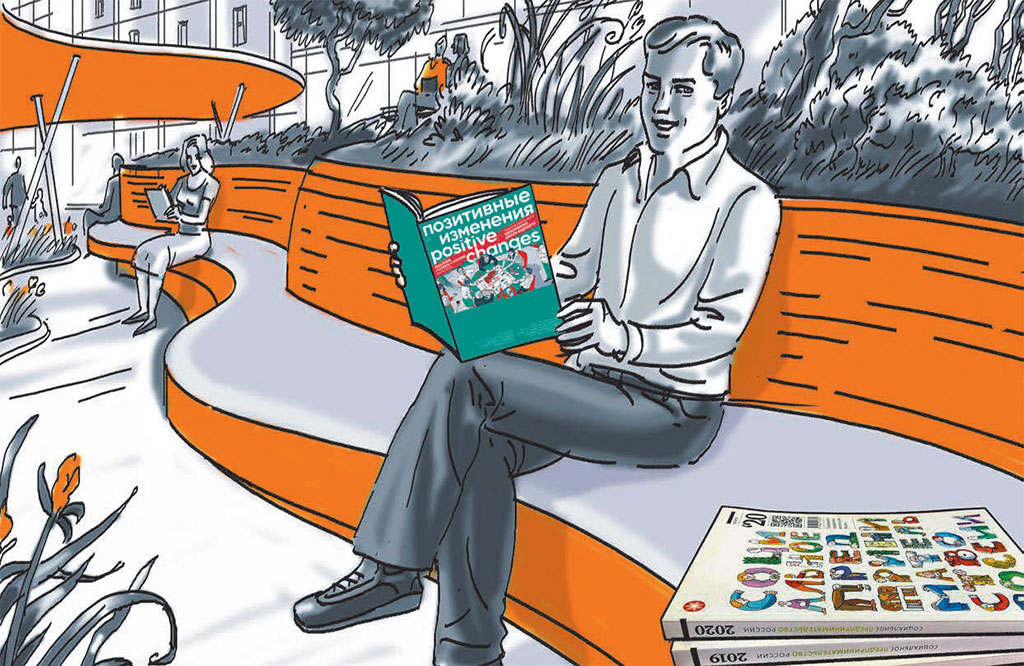
We have been collecting examples, cases studies and reviews of social enterprises, regardless of their form of ownership or field of activity, since 2014. Why? Because we can see how these phenomena, virtually invisible at the statistics and GDP calculations level, are gradually developing into new elements of the economy. One of their key traits is eagerness to cooperate and get to know each other. It was this trait that triggered a chain of enabling legislation in one of the world’s most advanced economies, the Republic of Korea, making it possible to move from the law on social enterprises to a broader legislation on social cooperation and then to a law on social economy.
Social enterprises are potentially positioned from the start to build ecosystems of positive changes when the time comes to do so. They develop a set of businesses and communities that form part of a unified system working to create and build a human-centered social economy.
In each issue of the Positive Changes Journal, we continue the work that started with the publication of the annual catalog “Social Entrepreneurship in Russia.” We introduce our readers and researchers to the enterprises combining properties of two traditional economic agents – non-profits and commercial entities. This combination makes it possible to create entities carrying positive change models of the future – social enterprises. These, in turn, create, implement and share their experience and practical solutions over all industries. The key today is to view them precisely as drivers of the future, and so the main criteria for social enterprises to be featured in the Journal is to have data on the assessment of social effect and social impact on the life of the community and the public in general.

Vladimir Vainer
Director of Positive Changes Factory
EGO Educational Company. The Company’s Intellectual Innovation Product Is the Healthy EGO Original Social Project

https://egocompany.ru
An interactive offline cultural and educational course, aimed at intellectual psychological help to representatives of socially unprotected categories of population: alcohol and drug addicts, people in rehabilitation, in deep depression and frustration, as well as orphaned children and children with disabilities. The course promotes spiritual development, acquisition of confident reasoned speaking skills, removes psychological barriers before the audience, raises interest in literature and history, strengthens patriotic feelings, and facilitates the desire for self-realization, healthy interests in life.
PROBLEM ADDRESSEDAddicts in rehabilitation:
1. Loss of interest in life and society, fear of people, insecurity.
2. Impaired brain activity, cognitive changes, as a consequence – loss of interest in reading and education in general, difficulties in finding themselves and their place in the society, loss of meaning in life.
3. A psychological barrier to public speaking, formed under the influence of negative events in grown-up life or earlier, at school or university.
4. Lack of knowledge from the school or university, which requires self-education skills, and complete self-realization in the future.
5. Depressive personality state, passive position in life.
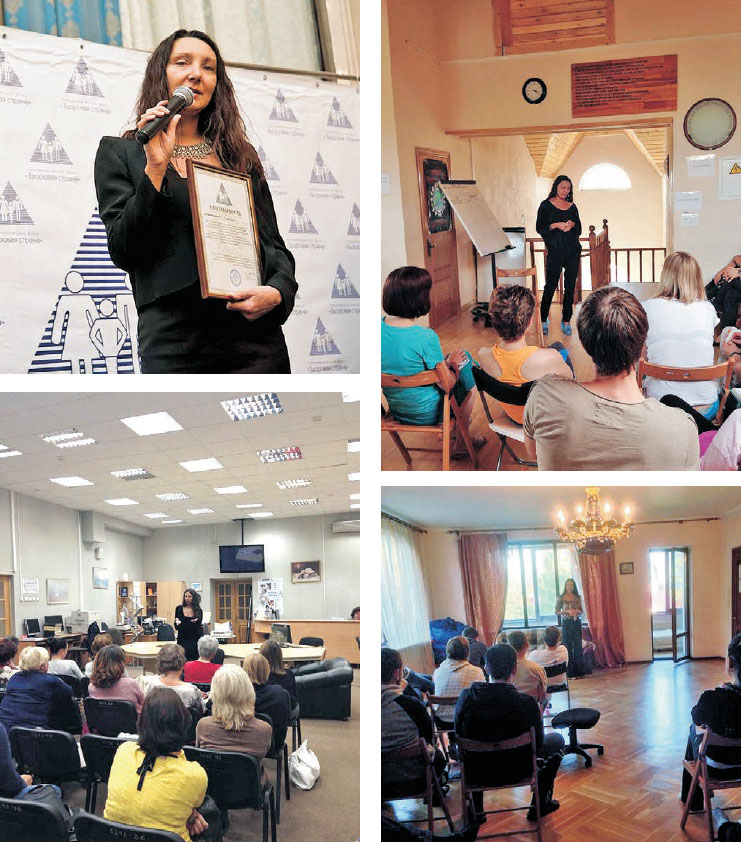
1. Development of children’s logical and associative thinking, radiant thinking.
2. Problems with memory and speech development, anxiety, embarrassment in front of other children.
3. Improved morale from successes in understanding literature, painting, and the ability to analyze and construct thought.
4. A passion for self-knowledge through learning spiritual values and the foundations of Christian morality.
5. Patriotic education through taking pride in fellow countrymen – Russian classical authors.
6. Developing goodwill on the issue of caring for the Russian nature by fostering love and a reverent attitude toward it.
METHODS USED TO ADDRESS THE PROBLEMThe course is based on the Russian classical literature and some fragments from the history of the Russian society. The basic block includes 25 sessions of 90 minutes each in groups of up to 20 students. The project is implemented at the rehabilitation center or an orphanage/shelter with obligatory staff control over homework performance. The course includes meetings between the author/host and the students in the format of creative interaction and reasoned discussion based on the material delivered and personal analysis of the reading. It is a lively interactive process of acquiring public speaking skills and developing logical and associative thinking. An important feature of the course is the subtle interweaving of the group and individual learning format maximizing the engagement of each student.
1. Assistance in preparing to read and analyze in detail the works of Russian classics.
2. Development of independent work skills.
3. Maximum engagement in solving logical problems based on the Russian classical literature.
4. The author’s maximum concentration on the individual problems of each student in the course and the setting up the work with each student after carefully studying his/her abilities, talents, and giftedness.
5. Sessions in small groups with the aim of loosening up each listener, helping them develop and strengthen their public speaking skills and feel comfortable in public, while gently removing the psychological barriers.
Problem solving is built into the program for each target audience, taking into account their age and the specifics of the problems. It is recommended for each class to have at least 25 sessions of 90 minutes 1–2 times a week with mandatory homework.
For example, a course for alcohol and drug addicts in rehab includes:
• An introduction to the concept of classical literature and its role in the life of every person;
• Classicism in European and Russian literature;
• Realism in Russian literature;
• Denis Fonvizin (historical background on the Catherine rule period in the Russian history, biography, analysis of the “Young Ignoramus” play, related materials, discussion);
• Alexander Griboyedov (historical note on the events preceding the Decembrist revolt in the Russian history, biography, analysis of “The Woes of Wit” play, related materials, discussion);
• Alexander Pushkin (ingenuity, uniqueness, biography, analysis of the “Eugene Onegin” novel, related materials, discussion);
• The basics of symbolism and the notion of the “Little Man” in Russian Literature (in-depth line-by-line analysis of Alexander Pushkin’s “The Bronze Horseman” poem, related materials, discussion);
• Biblical truths and Christian morality in the Russian literature, using “A Terrible Vengeance” by Nikolai Gogol, the works of Nikolai Leskov, etc. (the number of works depends on the students’ enthusiasm for the discussion and the course duration);
• Selected lyrical works to explain the concept of the “lyrical hero” and, e.g., symbolism.
Sustainability of the results is ensured by the following mechanism: instructing staff members to continue the classes on their own, working with the parents of addicts to set up an environment conductive to further development at home, helping to consolidate and augment the results achieved during the course.
ACCOMPLISHMENTS AND AWARDS• Certificate of Reliable Enterprise in Moscow No. 000.046.
• Certificate of Reliable Partner of the Chamber of Commerce and Industry of the Russian Federation No. 00913–315.
• Member of the Chamber of Commerce and Industry of the Russian Federation and the Moscow Chamber of Commerce and Industry since 2014.
• Entered in the Register of Social Enterprises of Moscow since 2021.
• 87th place in the Rating of Reliable Partners and Financially Stable Enterprises of the Central Federal District of Russia.
WHAT WAS DONE LAST YEARA total of 24 sessions of 90 minutes each were conducted with 152 residents in two rehabilitation centers in Moscow.
DIRECT RESULTS FOR 2021Opinion of the management of rehabilitation centers and the Healthy Country Foundation, who participated in the project pilot (confirmed by the original official documents):
1. Residents with drug and alcohol addiction demonstrated decreased anxiety and cravings for psychoactive substances.
2. Better mood and newly demonstrated interest in the spiritual component of the classical Russian literature.
3. After completing the rhetoric lessons, the residents started to articulate their thoughts and desires properly.
4. Increasing the number of participants: from 5 persons per group to 20.
5. Residents with psychoactive substance addiction who had previously been disinterested in spiritual and pedagogical development began to show an interest in learning.
SOCIAL EFFECTS ACHIEVED IN 2021Residents’ opinions about the course (quotes taken from written feedback):
• Yevgeniy L.: “The project helps me to develop comprehensively, reminds me that I am part of the society, makes my brain work better and make inferences based on the knowledge gained, by way of refection. It’s a good alternative to entertaining movies.”
• Victor P.: “I get a chance to develop intellectually, to train my memory. It gives me an opportunity to cope with the challenging situation. I would be very happy if classes were held more often, maybe even replacing some of the other activities in rehab. They give me an opportunity to improve my speech culture, literacy, and social skills.”
• Sasha S.: “I am a philologist by training, a translator and a foreign language teacher. Unfortunately, I never got to finish my graduate studies. When I got to Christina’s first class, I was pleasantly surprised by the simplicity of the presentation and depth of analysis. Her course creates a clearly discernible structure, which is very necessary at this time of scattered, chaotic and superficial knowledge, which often led me to lose interest in my classes at the institute. Christina’s dedication and love for the subject, the interactivity of the classes, and the heated discussions fuel the participants’ interest. I think that Christina’s course deserves the closest attention.”
• Alexander L.: “I want to thank Christina for her interesting original training program, for prioritizing rhetoric and oratory skills; for giving all of us an opportunity to reflect on topics that have nothing to do with our disease, to remember the history of the Russian state. I looked forward to every Saturday. I dare say that almost everybody here shares my feelings, emotions, and opinions on the advisability of further classes.”
SOCIAL AND ECONOMIC IMPACTBased on the experience of the pilot project in two rehabilitation centers, a person who has lost himself because of alcohol or drug addiction would like to return to a full life in society, to his forgotten healthy desires and interests: studying, getting a profession, working. Rehab residents acquire moral and spiritual strength and can once again become useful members of the society. It is up to the society to lend them a hand.
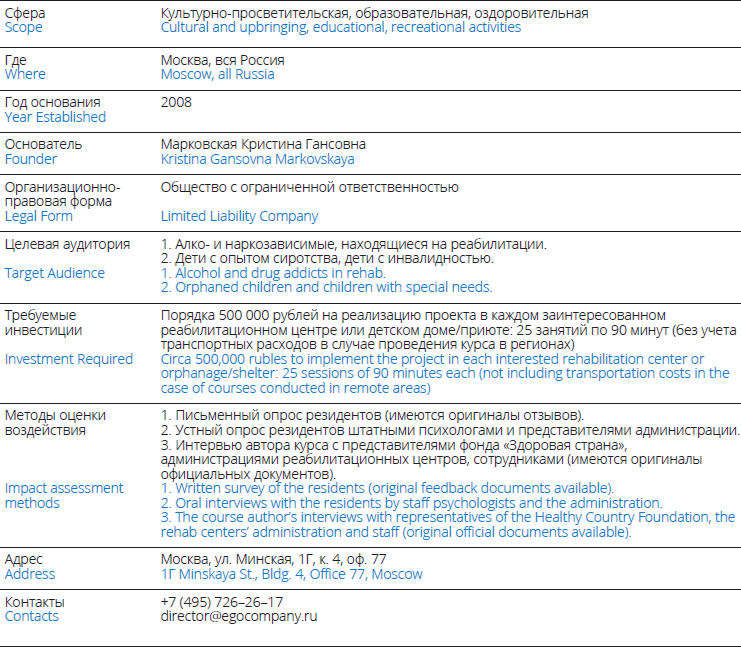
The course was tested free of charge, at the expense of the project author. The authors are now planning to scale up the project (to cover not only Moscow and the surrounding area, but all of Russia) by raising funding (social investors, grants, impact investment). In addition, a project monetization model is being developed. An important aspect is the prolonged effect of the course: people only need help in making the first step, breaking the shackles; then, with the support of psychologists and relatives, they continue to read the literature and engage in self-development.
QRepublik: Smart Medical Identifiers. A System for Health and Longevity
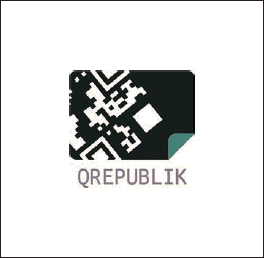

https://qrepublik.com
QRepublik is a comprehensive solution for emergency medical identification. The technology addresses the issue of the lack of information about a person in an emergency to help them and provides an easy way to access, store and manage information. A medical profile can be accessed anytime, anywhere with wristbands, sticker sets and watch attachments.
PROBLEM ADDRESSED30 % of people over 60 fall at least once a year, and about 54 % get serious injuries. Almost half of the injuries from falls result in impaired quality of life, and 95 % of injuries must be operated on within 24 to 48 hours, according to the WHO and the Russian Ministry of Health.
People with disabilities, people with chronic diseases (circulatory disorders, cancer, chronic respiratory diseases, diabetes), children, the elderly, athletes, tourists – anyone can find themselves in a life-threatening situation, where every second counts, and doctors need to get complete information about the person affected to provide quality care. The QRepublik medical identifiers save lives in critical situations, when a person has suffered an accident, is unconscious, or cannot speak. By scanning a QR code, the doctors get important information on any allergies the patient may have, what medicines they take, what diseases they have, their blood type, and their relatives’ contact information.
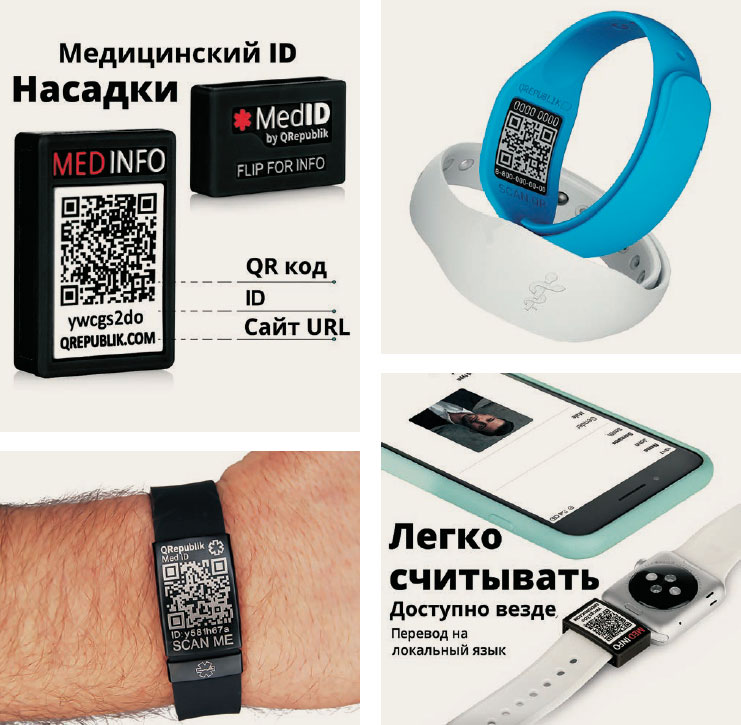
The Medical Identification System includes three technological solutions.
1. Aid Wristband non-electronic identifier is a medical identification tool for an emergency situation that provides an easy way to access, store and manage a user’s medical information.
2. Alarm Button Service. The button can be installed at an elderly person’s residence, for a quick contact with a social worker, a caregiver, or emergency services.
3. QDP Service collects information about the patient’s health status and processes the data using AI to predict the possible development of diseases, such as hypertension, congestive heart failure and diabetes.
ACCOMPLISHMENTS AND AWARDSTop 200 Initiatives for the “Strong Ideas for a New Time” forum.
Diploma and commemorative medal “For altruistic contribution to the organization of the All-Russian campaign of mutual aid #WeAreTogether”.
“Partner of National Projects” status (short-listed in “Our Contribution” ranking that evaluates the contribution of businesses and NGOs to the implementation of national projects and achievement of national goals at the end of 2021).
WHAT WAS DONE LAST YEARThe alarm button has been developed, development of AI-based disease prediction system started, and new users were connected to the medical identification system.
DIRECT RESULTS FOR 20216,500 people are connected to the system, alarm buttons are installed for people who do not leave their homes.
SOCIAL EFFECTS ACHIEVED IN 2021Evidence of lives saved is available.
SOCIAL AND ECONOMIC IMPACTAccording to our calculations, with the introduction of the Emergency Situation Identification System based on the Aid Wristbands and the Alarm Button Service, the annual commercial revenue for the social services units could be up to 151 million rubles in 2023 and 233.5 million rubles in 2024 per 30,000 people, respectively, not including a decrease in the load on the public health facilities.
FINANCIAL SUSTAINABILITY MODELThe first income item on the SaaS (Software as a Service) model is the subscription fee to an extended personal account, doctors’ consultations, and the disease prediction service.
The second income item is the production and sale of medical identifiers and alarm buttons.
The third income item is working with the B2B market.
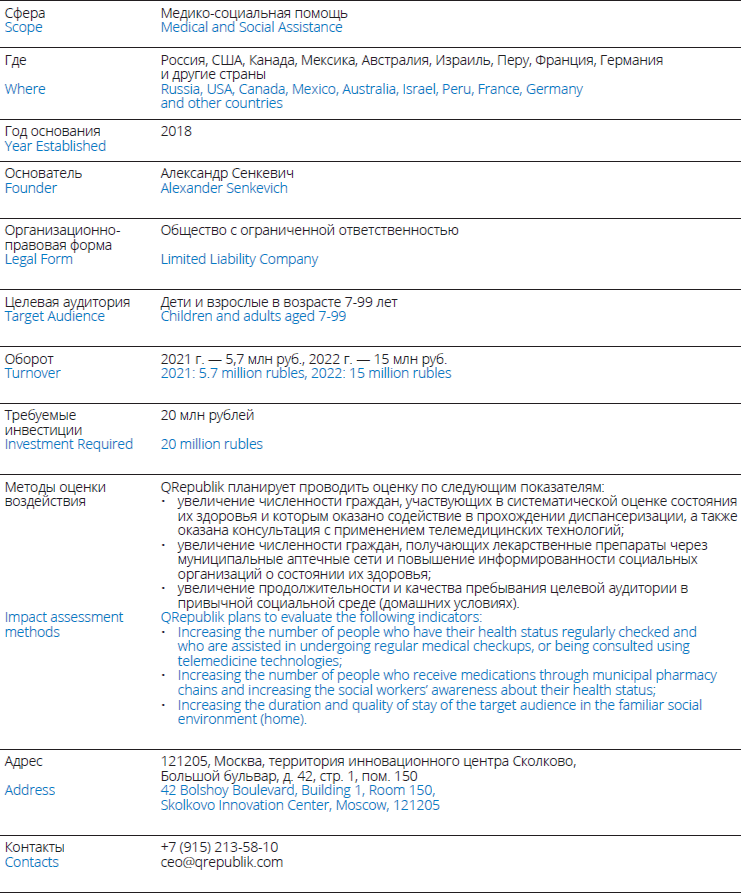
Starfish family pools. A Family Aqua Club Next Door
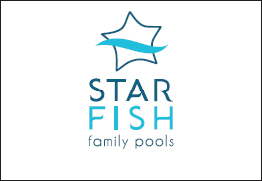

https://mystarfish.ru
STARFISH is an Aqua Club where the whole family can exercise and where everyone can find a wellness program that is right for them. Various classes are available for children and adults, including pregnant women, the elderly and people with disabilities. One advantage of STARFISH is potable-quality water in the swimming pools.
PROBLEM ADDRESSED• A set of training programs covering every age group from 0+ does not exist;
• Family members having to split up to attend recreation activities in different locations;
• The concept of family wellness, wherein a team of coaches leads each family member and the family in general to the desired result, is non-existent;
• Number of swimming pools is inadequate to the number of children born;
• Lack of swimming pools with really clean water (compliant with SanPiN regulations);
• Lack of public awareness on the benefits of early swimming and prenatal aqua exercises for pregnant women;
• Lack of recreation facilities accessible to people with disabilities;
• Lack of inclusive programs for children with disabilities and their parents;
• Lack of hydrotherapy and recreation opportunities for people with disabilities within walking distance;
• General shortage of specialists specializing in infant, early childhood and sports swimming;


